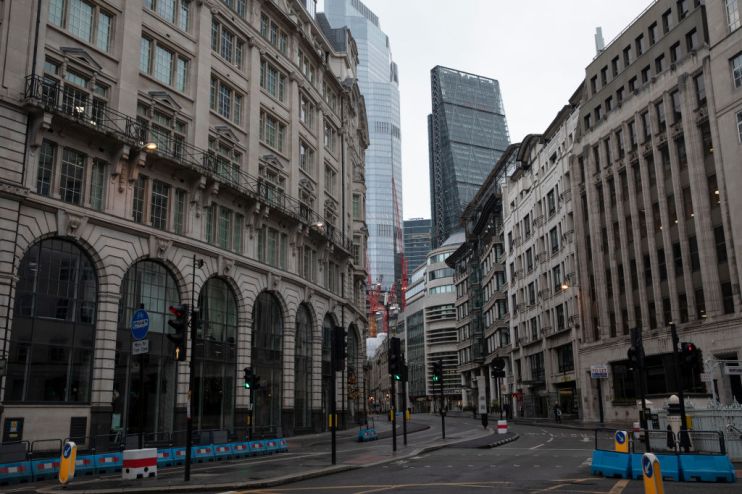A 21st century Big Bang 2.0 won’t look like the eighties – but it’s worth pursuing

UK financial services can unlock a new phase of growth by taking a lead on sustainability, digital innovation and governance, and redefining ‘Big Bang’ to be far more than simply deregulating markets.
Chancellor Rishi Sunak spoke of the City’s “perfect platform” for a post-Brexit “Big Bang” last week but remained equivocal on how the new era for UK financial services might unfold.
UK financial services firms are notably absent from the terms of the deal set to shape our future relationship with the EU, extending the continuum of uncertainty for many businesses across the sector.
Read more: Chancellor Rishi Sunak speaks to City A.M. Editor Andy Silvester about the City’s future
Now, as negotiations on future regulatory co-operation progress towards a Memorandum of Understanding, it is crucial for the City to think beyond equivalence as the best possible outcome and consider new focus areas for innovation and evolution that will underpin its future.
Against a challenging economic backdrop, the future fundamentals of UK financial services – of growth and revenues, tax, talent and jobs, and gross value added (GVA) to the UK economy – must come to the fore, and are likely to be driven by big, structural shifts in a now post-Brexit world. Three key areas stand out for the City – and UK financial services more broadly – to harness and shape the next “Big Bang”.
First, UK financial services has an opportunity to take the lead globally on tackling climate risk and in building a world-leading regulatory framework for sustainable finance. As a gold standard setter on numerous policy areas including TCFD disclosure requirements, and as host of COP26 later this year, the UK is already setting the scene as the leading voice on this topic. The challenge will be maintaining and driving further momentum.
Read more: BP takes majority stake in carbon offset firm as green push continues
Mitigating the physical and transitional risks to economies and asset values will be critical to the UK’s economic recovery, as well as to defining UK financial services’ new role on the global stage. The UK ranks within the top ten countries globally on reporting ESG activity, with UK banks ranking top in governance metrics such as board independence and shareholder protection and within the top 30 countries globally for environmental and social metrics.
When ranked against their peers in Europe and the US, the UK’s largest banks come first for incorporating key social factors into their strategy and second for progressive environmental controls – elements which have risen rapidly up both investors’ and societies’ priorities through the challenges of the pandemic.
The City can be the world centre for financing the transition – through share and bond issuance, lending, and investment. This will require leadership on the agreement of international standards, and holding the ring on the multiplicity of current initiatives to improve definitions, disclosures, risk approaches and customer interactions – all while supporting those that may be left behind by the green revolution.
The Bank of England’s emphasis on supporting the transition to a carbon neutral economy, and the UK’s ongoing strong supervisory framework should accelerate financial services’ focus on environmental factors. But firms need to go beyond regulation if they are to achieve tangible progress in building more sustainable and resilient foundations to long-term value creation – especially if they are to set the pace for firms around the world to follow.
Over the coming months, the UK’s financial services sector must work collaboratively to help shape and start to execute the Government’s ambitions for greening financial systems, mobilising finance for clean and resilient growth, and harnessing the emergent opportunity set for the UK economy.
Read more: Be eco-rational: The world’s environmental problems are too serious for petty political dogma
Second, the UK financial services sector must build on its digital transformation and the progress already made across its infrastructure, services and processes. Rishi Sunak spoke of the importance of digital currencies – which the Bank of England is a leading global voice on – and developments in the UK’s payments infrastructure.
Underpinned by a strong regulatory environment that supports digital growth, UK financial services must continue major capital expenditure in financial technology to maintain a leading global role, with enhanced consumer protections a critical pillar of the digital transition. Privacy will remain at the centre of emerging regulation, in turn supporting digital progress through the Cloud and AI that enables better customer understanding, improves choice, and drives efficiencies and operational resilience.
Third, and perhaps most importantly, as the global economy looks set to become increasingly bifurcated across geopolitical lines, the UK must maintain and build on its heritage of strong corporate governance, as one of the best places in the world to do business – reinforced by industry codes and regulation. Financial services firms’ dedication to improving stakeholder capitalism can drive positive change far beyond the boundaries of the sector. To do this, firms need to create and uphold strong standards and hold each other accountable.
These three areas – sustainability, digital innovation and governance – provide a springboard for UK financial services, and an opportunity to define a new internationalism and redefine a 21st century “Big Bang”. Britain’s financial institutions must be bolder than ever before in order to achieve these goals. As UK financial services – and the Government – consider the next five, 10 and 20 years, the industry’s leadership in sustainability, in technology and innovation, in attracting and retaining talent to its open and progressive market, and in creating a regulatory regime that is unencumbered, innovative and progressive, is crucial. UK financial services must be primed and resilient to the hurdles ahead, rather than compensating for the borders of the past.
Read more: As an activist, I’m not entitled to lose hope in Hong Kong’s struggle